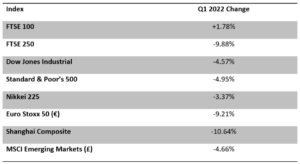
Despite the numerous shocks that occurred in the first quarter of 2022, the world’s share markets held up surprisingly well.

Cast your mind back to the start of the year. The world was coming to terms with the latest Omicron variant of Covid-19, which was supposedly proving less serious than its predecessors. The latest available UK inflation figure (for November 2021) was 5.1% and the Bank of England had delivered an early Christmas present of a 0.15% rise in interest rates to 0.25%. Across the Atlantic, US inflation was higher at 6.8%, but the US central bank, the Federal Reserve, had delayed its first increase in interest rates. Investment markets had enjoyed a generally good 2021, particularly in the US, and while interest rate rises were expected in 2022, the post-pandemic investment outlook was reasonably sunny.
Two events in the first quarter of 2022 changed that benign picture:
- Central banks decided that they need to take much stronger action against rising inflation. The Bank of England raised rates twice in the quarter, taking them up to their pre-pandemic level. In the US, rates rose just once, but the Federal Reserve had not yet quelled suggestions that there could be rate rises at each of its next six meetings in 2022.
- Russia invaded Ukraine on 24 February, creating political and economic disruption that continues to echo around the globe.
Against such a background, it would be surprising if stock markets had continued posting fresh gains. As the table shows, most markets registered modest falls, although what the table does not show is that all ended the quarter above the lows they hit in early March. The FTSE 100 was one of the best performing indices over the quarter, a position it has rarely seen in recent years. Ironically, that performance was largely due to what had previously made the index open to criticism – its heavy weighting to ‘old world stocks’ of oil majors, miners and banks.
Given the shocks that occurred in the first quarter of 2022, global share markets held up well. One reason put forward, which is worth all investors considering, is TINA – There Is No Alternative. When fixed interest bonds are threatened by sharply rising interest rates, but deposit rates are still hugely outpaced by inflation, shares can look like the best option for your money and investments – especially if they are cheaper now than at the start of the year.
If you are interested in discussing the above with one of our experienced financial planners, please get in touch here.
The value of your investment and any income from it can go down as well as up and you may not get back the full amount you invested. Past performance is not a reliable indicator of future performance. Investing in shares should be regarded as a long-term investment and should fit in with your overall attitude to risk and financial circumstances.





